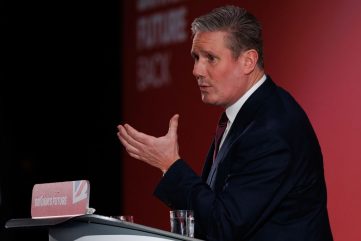
Keir Starmer, the UK’s Leader of the Opposition, has announced that his Labour Party will scrap its flagship pledge to spend £28bn a year on green energy projects, slashing the fund to just £4.7bn, or £23.7bn over the party’s potential five-year run in office.
The plan, first announced in 2021, was set to be a key piece of policy in the party’s election manifesto. Starmer is expected to say on Thursday that Labour will no longer commit to the annual green investment if it wins the general election, expected to be held in autumn this year. Currently, Labour is leading by some margin in the polls and a win against the current Conservative Government looks likely.
The funding for the party’s Green Prosperity Plan would have seen borrowed money spent on domestic clean energy projects such as battery and electric vehicle factories, offshore wind farms constructed with domestically produced wind turbines and the development of a hydrogen industry. Labour has also outlined plans to create a new, publicly owned clean energy company if it wins the election.
During his announcement, Starmer blamed a dire economic situation, which he said was inherited from former Conservative Prime Minister Liz Truss’s brief time in office in 2022. “As conditions change, you adjust your position,” he said on Thursday. Labour will now only spend £23.7bn over the course of five years, compared with the original £140bn pledged in 2021.
Speculation over whether Labour will walk back on the investment plan has been ongoing for weeks as senior party figures repeatedly refused to specify the £28bn figure when pressed in interviews. However, Starmer himself said as recently as Tuesday that the funding was “desperately needed,” an announcement advocates of the pledge saw as a welcome recommitment.
When the pledge was originally announced by Shadow Chancellor Rachel Reeves, the party planned to begin its £28bn investment immediately after taking office and invest the same amount every year for the following decade. This promise was already watered down in June last year, when Reeves said the full amount would only be reached halfway through Labour’s term, in 2027.

US Tariffs are shifting - will you react or anticipate?
Don’t let policy changes catch you off guard. Stay proactive with real-time data and expert analysis.
By GlobalDataThe U-turn, which could be seen as revealing a weakness in Labour’s policy and financial planning, will be welcome news to the Conservatives as the party continues to trail in the polls, although Prime Minister Rishi Sunak has also faced backlash in the past year for walking back on his own party’s key climate policies and for continuing to grant oil and gas licences in the North Sea.
Laura Trott, Conservative MP and Chief Secretary to the Treasury, told BBC News that Starmer’s U-turn “confirms Labour have no plan for the UK, creating uncertainty for business and our economy. On the day that Labour are finalising their manifesto, Keir Starmer is torpedoing what he has claimed to be his central economic policy purely for short-term campaigning reasons.”
Carla Denyer, co-leader of the Green Party, called the move a “massive backward step”. She said: “Labour have chosen to wear their fiscal rules as a millstone around their neck. A different approach through tax reforms, in particular by introducing a wealth tax on the super-rich, could help pay for the green transition. There is more than enough money in the economy to pay for this.”
Some clean energy companies are less critical. Peter Gerstmann, co-founder of Photovolt Development Partners, the developer of one of Europe’s biggest solar farms, told Power Technology: “The focus on delivering the energy transition need not be driven by large capital spending. Solar farms can deliver the renewable power we need quickly, and relatively cheaply – but only with the right national infrastructure.
“Labour’s focus must turn to increasing the capacity of Ofgem, planning authorities and the national grid to deliver renewables projects at scale,” he added.
Details on new plans will emerge with Labour’s finalised manifesto, the deadline for which has been brought forward to Thursday.



